Brexit Report: Challenges, Economic Impact, and Manufacturing Exports
VerifiedAdded on 2023/01/11
|7
|1640
|68
Report
AI Summary
This report provides an in-depth analysis of the multifaceted impacts of Brexit. It begins by outlining the challenges faced by the UK as a member of the European Union, including the costs of membership, immigration concerns, and the complexities of making its own laws. The report then delves into the economic consequences of Brexit, examining its impact on both the UK and other member nations. It explores the implications of Article 50 and new trade relations. Furthermore, the report investigates the effects of Brexit on the export of goods from manufacturing firms, highlighting the challenges and opportunities that have emerged. The report concludes by summarizing key findings and emphasizing the need for effective policies to mitigate negative impacts and boost the UK economy post-Brexit.
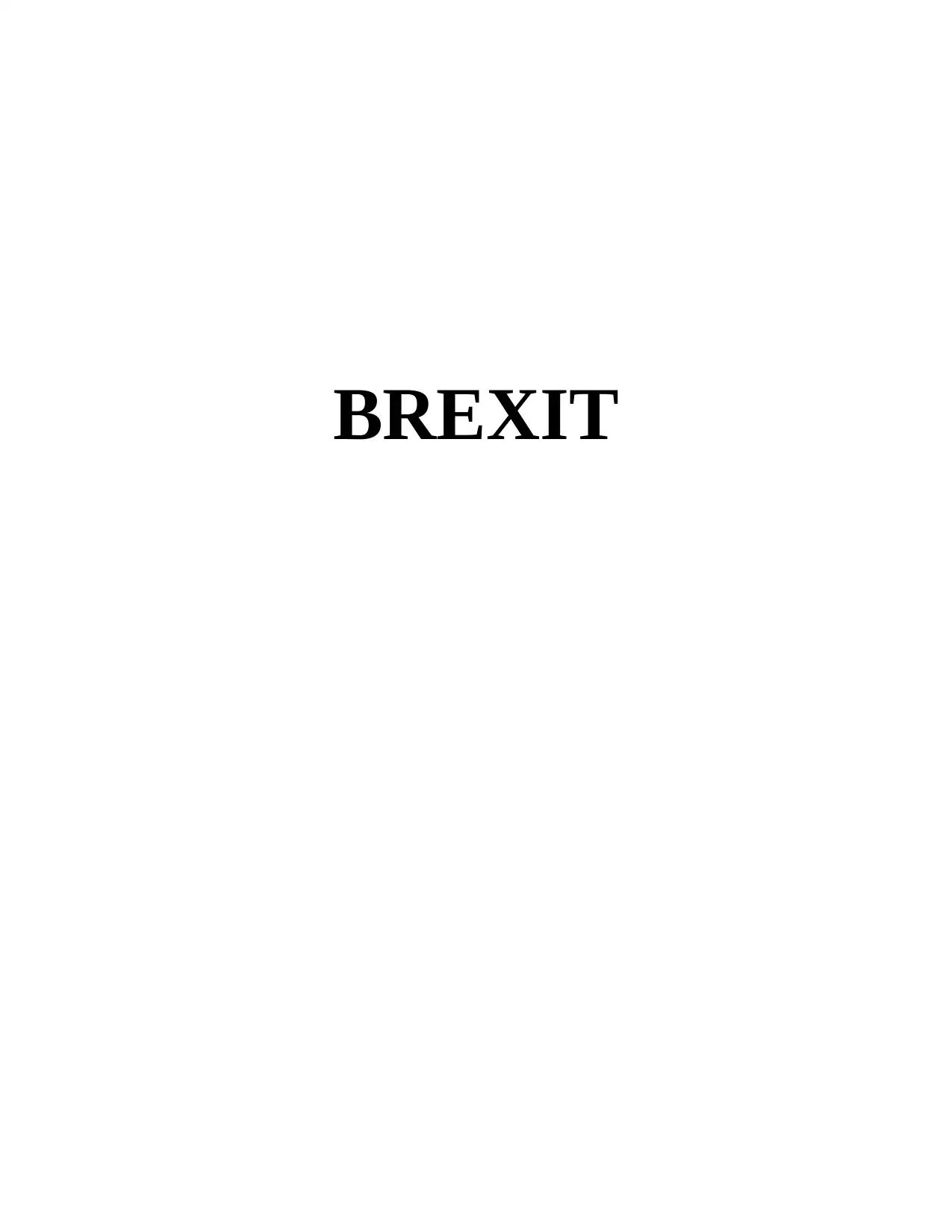
BREXIT
Paraphrase This Document
Need a fresh take? Get an instant paraphrase of this document with our AI Paraphraser
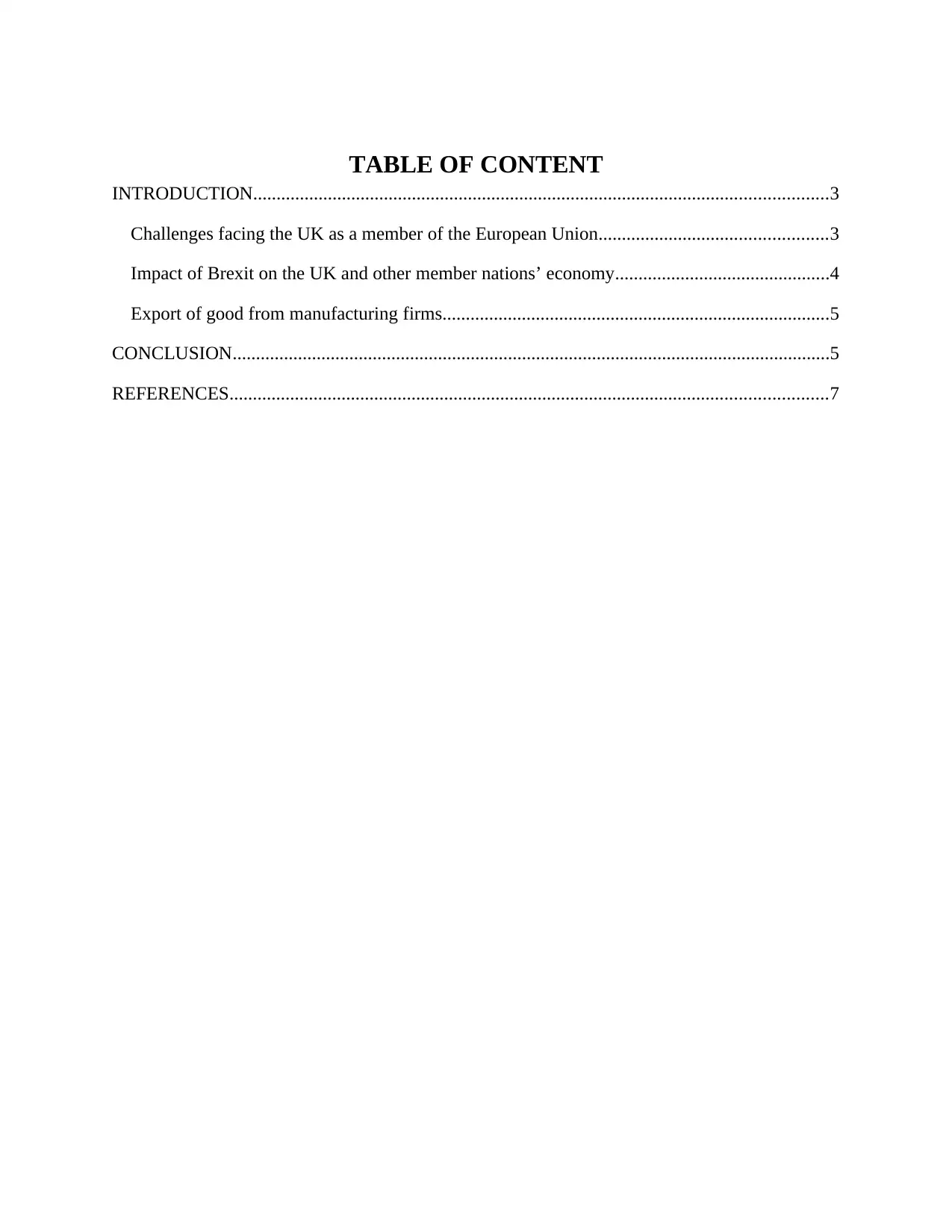
TABLE OF CONTENT
INTRODUCTION...........................................................................................................................3
Challenges facing the UK as a member of the European Union.................................................3
Impact of Brexit on the UK and other member nations’ economy..............................................4
Export of good from manufacturing firms...................................................................................5
CONCLUSION................................................................................................................................5
REFERENCES................................................................................................................................7
INTRODUCTION...........................................................................................................................3
Challenges facing the UK as a member of the European Union.................................................3
Impact of Brexit on the UK and other member nations’ economy..............................................4
Export of good from manufacturing firms...................................................................................5
CONCLUSION................................................................................................................................5
REFERENCES................................................................................................................................7
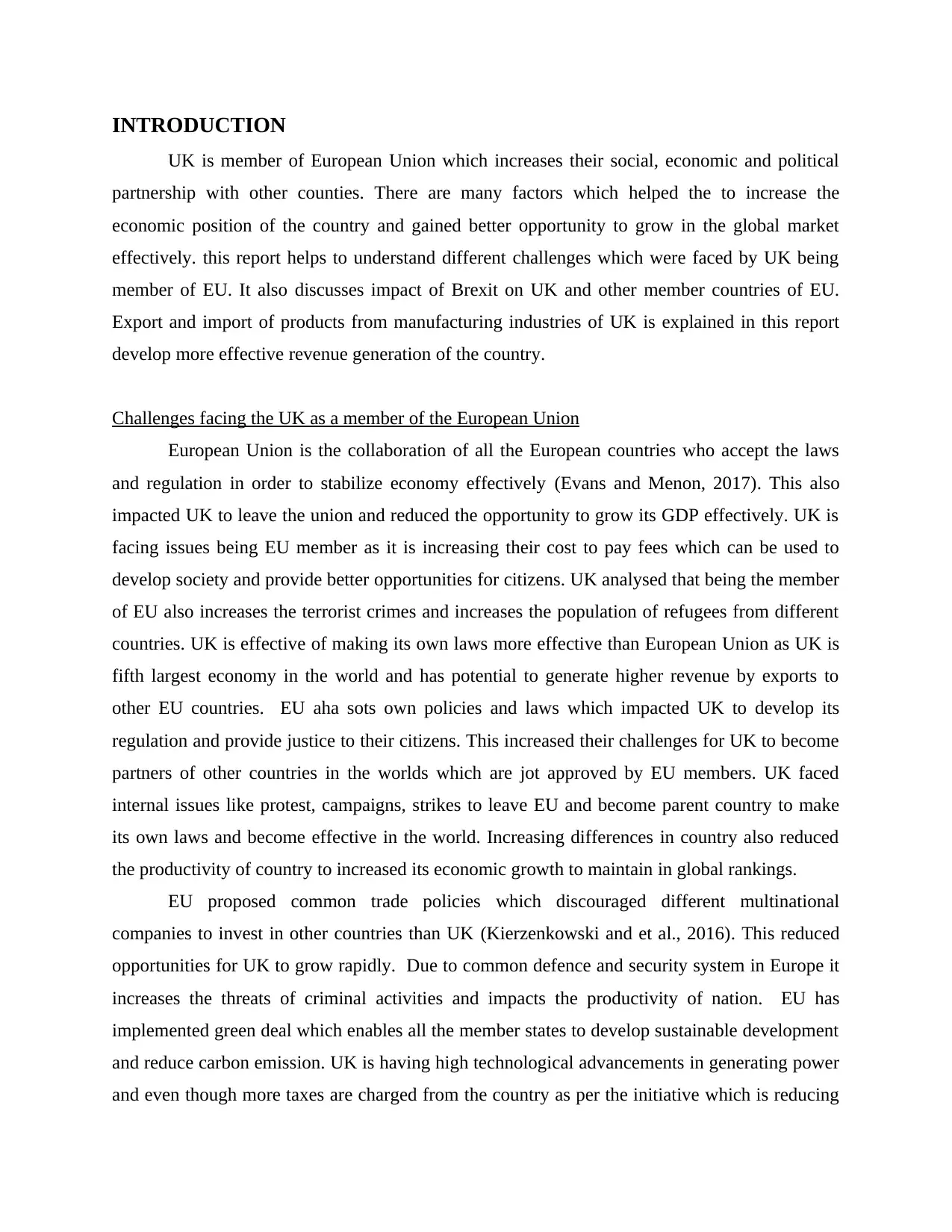
INTRODUCTION
UK is member of European Union which increases their social, economic and political
partnership with other counties. There are many factors which helped the to increase the
economic position of the country and gained better opportunity to grow in the global market
effectively. this report helps to understand different challenges which were faced by UK being
member of EU. It also discusses impact of Brexit on UK and other member countries of EU.
Export and import of products from manufacturing industries of UK is explained in this report
develop more effective revenue generation of the country.
Challenges facing the UK as a member of the European Union
European Union is the collaboration of all the European countries who accept the laws
and regulation in order to stabilize economy effectively (Evans and Menon, 2017). This also
impacted UK to leave the union and reduced the opportunity to grow its GDP effectively. UK is
facing issues being EU member as it is increasing their cost to pay fees which can be used to
develop society and provide better opportunities for citizens. UK analysed that being the member
of EU also increases the terrorist crimes and increases the population of refugees from different
countries. UK is effective of making its own laws more effective than European Union as UK is
fifth largest economy in the world and has potential to generate higher revenue by exports to
other EU countries. EU aha sots own policies and laws which impacted UK to develop its
regulation and provide justice to their citizens. This increased their challenges for UK to become
partners of other countries in the worlds which are jot approved by EU members. UK faced
internal issues like protest, campaigns, strikes to leave EU and become parent country to make
its own laws and become effective in the world. Increasing differences in country also reduced
the productivity of country to increased its economic growth to maintain in global rankings.
EU proposed common trade policies which discouraged different multinational
companies to invest in other countries than UK (Kierzenkowski and et al., 2016). This reduced
opportunities for UK to grow rapidly. Due to common defence and security system in Europe it
increases the threats of criminal activities and impacts the productivity of nation. EU has
implemented green deal which enables all the member states to develop sustainable development
and reduce carbon emission. UK is having high technological advancements in generating power
and even though more taxes are charged from the country as per the initiative which is reducing
UK is member of European Union which increases their social, economic and political
partnership with other counties. There are many factors which helped the to increase the
economic position of the country and gained better opportunity to grow in the global market
effectively. this report helps to understand different challenges which were faced by UK being
member of EU. It also discusses impact of Brexit on UK and other member countries of EU.
Export and import of products from manufacturing industries of UK is explained in this report
develop more effective revenue generation of the country.
Challenges facing the UK as a member of the European Union
European Union is the collaboration of all the European countries who accept the laws
and regulation in order to stabilize economy effectively (Evans and Menon, 2017). This also
impacted UK to leave the union and reduced the opportunity to grow its GDP effectively. UK is
facing issues being EU member as it is increasing their cost to pay fees which can be used to
develop society and provide better opportunities for citizens. UK analysed that being the member
of EU also increases the terrorist crimes and increases the population of refugees from different
countries. UK is effective of making its own laws more effective than European Union as UK is
fifth largest economy in the world and has potential to generate higher revenue by exports to
other EU countries. EU aha sots own policies and laws which impacted UK to develop its
regulation and provide justice to their citizens. This increased their challenges for UK to become
partners of other countries in the worlds which are jot approved by EU members. UK faced
internal issues like protest, campaigns, strikes to leave EU and become parent country to make
its own laws and become effective in the world. Increasing differences in country also reduced
the productivity of country to increased its economic growth to maintain in global rankings.
EU proposed common trade policies which discouraged different multinational
companies to invest in other countries than UK (Kierzenkowski and et al., 2016). This reduced
opportunities for UK to grow rapidly. Due to common defence and security system in Europe it
increases the threats of criminal activities and impacts the productivity of nation. EU has
implemented green deal which enables all the member states to develop sustainable development
and reduce carbon emission. UK is having high technological advancements in generating power
and even though more taxes are charged from the country as per the initiative which is reducing
⊘ This is a preview!⊘
Do you want full access?
Subscribe today to unlock all pages.

Trusted by 1+ million students worldwide
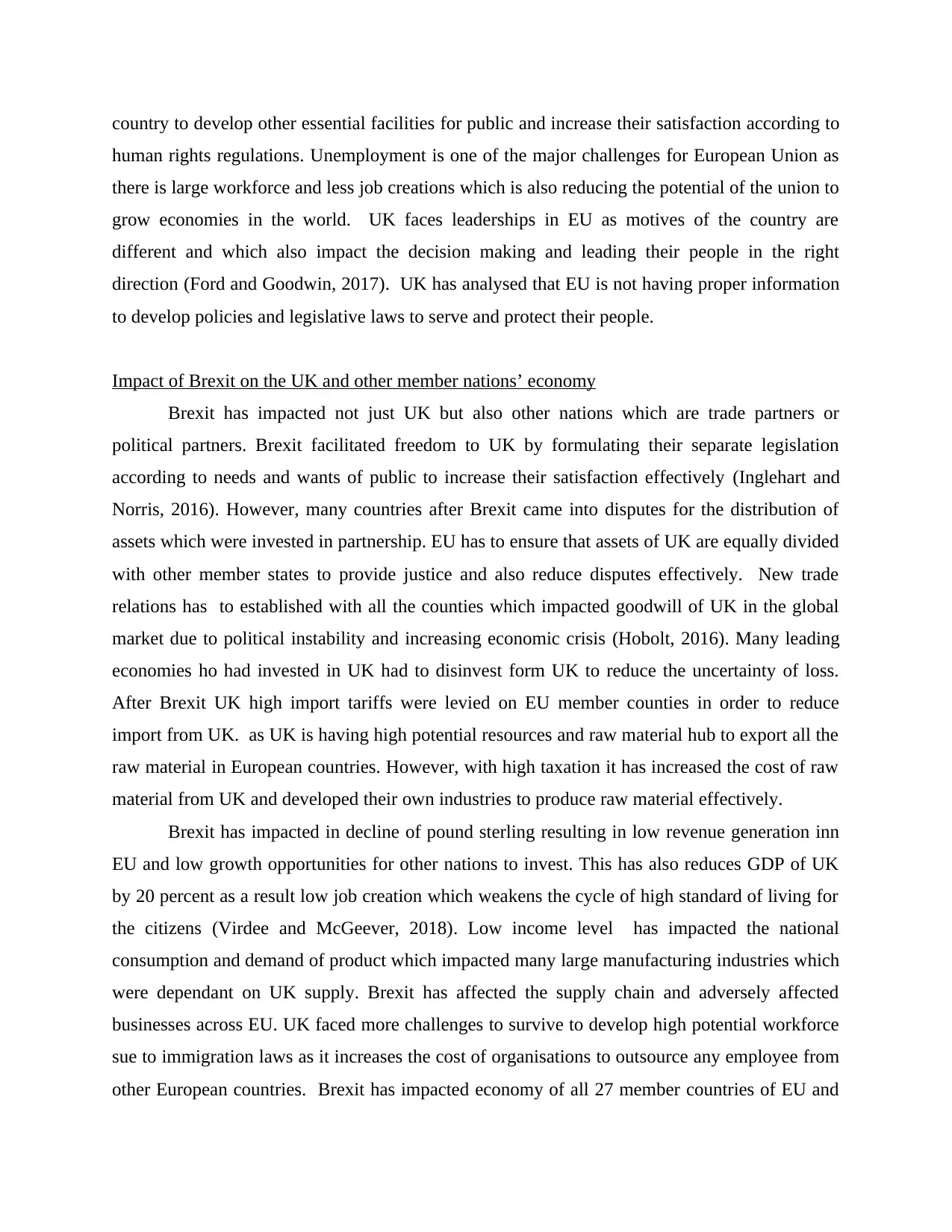
country to develop other essential facilities for public and increase their satisfaction according to
human rights regulations. Unemployment is one of the major challenges for European Union as
there is large workforce and less job creations which is also reducing the potential of the union to
grow economies in the world. UK faces leaderships in EU as motives of the country are
different and which also impact the decision making and leading their people in the right
direction (Ford and Goodwin, 2017). UK has analysed that EU is not having proper information
to develop policies and legislative laws to serve and protect their people.
Impact of Brexit on the UK and other member nations’ economy
Brexit has impacted not just UK but also other nations which are trade partners or
political partners. Brexit facilitated freedom to UK by formulating their separate legislation
according to needs and wants of public to increase their satisfaction effectively (Inglehart and
Norris, 2016). However, many countries after Brexit came into disputes for the distribution of
assets which were invested in partnership. EU has to ensure that assets of UK are equally divided
with other member states to provide justice and also reduce disputes effectively. New trade
relations has to established with all the counties which impacted goodwill of UK in the global
market due to political instability and increasing economic crisis (Hobolt, 2016). Many leading
economies ho had invested in UK had to disinvest form UK to reduce the uncertainty of loss.
After Brexit UK high import tariffs were levied on EU member counties in order to reduce
import from UK. as UK is having high potential resources and raw material hub to export all the
raw material in European countries. However, with high taxation it has increased the cost of raw
material from UK and developed their own industries to produce raw material effectively.
Brexit has impacted in decline of pound sterling resulting in low revenue generation inn
EU and low growth opportunities for other nations to invest. This has also reduces GDP of UK
by 20 percent as a result low job creation which weakens the cycle of high standard of living for
the citizens (Virdee and McGeever, 2018). Low income level has impacted the national
consumption and demand of product which impacted many large manufacturing industries which
were dependant on UK supply. Brexit has affected the supply chain and adversely affected
businesses across EU. UK faced more challenges to survive to develop high potential workforce
sue to immigration laws as it increases the cost of organisations to outsource any employee from
other European countries. Brexit has impacted economy of all 27 member countries of EU and
human rights regulations. Unemployment is one of the major challenges for European Union as
there is large workforce and less job creations which is also reducing the potential of the union to
grow economies in the world. UK faces leaderships in EU as motives of the country are
different and which also impact the decision making and leading their people in the right
direction (Ford and Goodwin, 2017). UK has analysed that EU is not having proper information
to develop policies and legislative laws to serve and protect their people.
Impact of Brexit on the UK and other member nations’ economy
Brexit has impacted not just UK but also other nations which are trade partners or
political partners. Brexit facilitated freedom to UK by formulating their separate legislation
according to needs and wants of public to increase their satisfaction effectively (Inglehart and
Norris, 2016). However, many countries after Brexit came into disputes for the distribution of
assets which were invested in partnership. EU has to ensure that assets of UK are equally divided
with other member states to provide justice and also reduce disputes effectively. New trade
relations has to established with all the counties which impacted goodwill of UK in the global
market due to political instability and increasing economic crisis (Hobolt, 2016). Many leading
economies ho had invested in UK had to disinvest form UK to reduce the uncertainty of loss.
After Brexit UK high import tariffs were levied on EU member counties in order to reduce
import from UK. as UK is having high potential resources and raw material hub to export all the
raw material in European countries. However, with high taxation it has increased the cost of raw
material from UK and developed their own industries to produce raw material effectively.
Brexit has impacted in decline of pound sterling resulting in low revenue generation inn
EU and low growth opportunities for other nations to invest. This has also reduces GDP of UK
by 20 percent as a result low job creation which weakens the cycle of high standard of living for
the citizens (Virdee and McGeever, 2018). Low income level has impacted the national
consumption and demand of product which impacted many large manufacturing industries which
were dependant on UK supply. Brexit has affected the supply chain and adversely affected
businesses across EU. UK faced more challenges to survive to develop high potential workforce
sue to immigration laws as it increases the cost of organisations to outsource any employee from
other European countries. Brexit has impacted economy of all 27 member countries of EU and
Paraphrase This Document
Need a fresh take? Get an instant paraphrase of this document with our AI Paraphraser
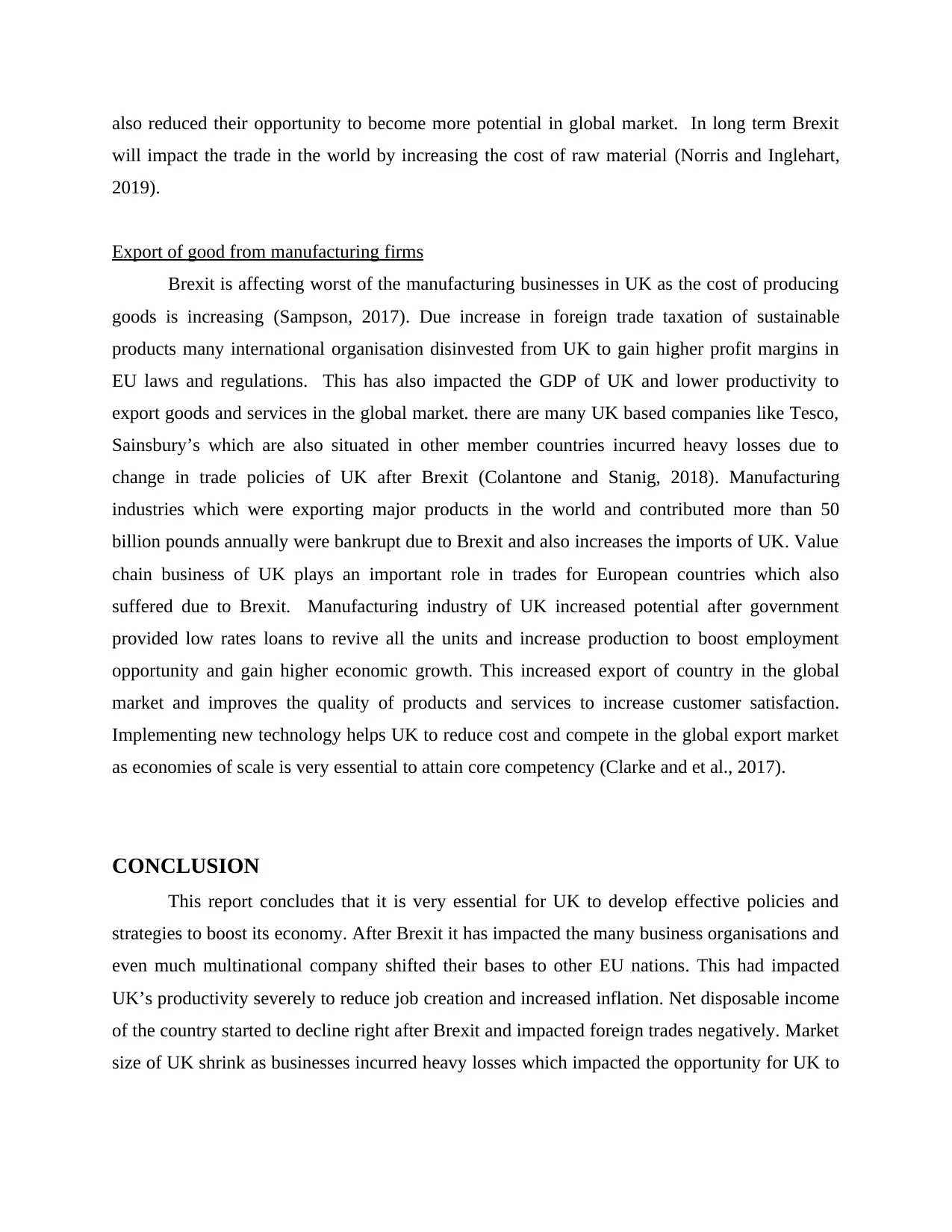
also reduced their opportunity to become more potential in global market. In long term Brexit
will impact the trade in the world by increasing the cost of raw material (Norris and Inglehart,
2019).
Export of good from manufacturing firms
Brexit is affecting worst of the manufacturing businesses in UK as the cost of producing
goods is increasing (Sampson, 2017). Due increase in foreign trade taxation of sustainable
products many international organisation disinvested from UK to gain higher profit margins in
EU laws and regulations. This has also impacted the GDP of UK and lower productivity to
export goods and services in the global market. there are many UK based companies like Tesco,
Sainsbury’s which are also situated in other member countries incurred heavy losses due to
change in trade policies of UK after Brexit (Colantone and Stanig, 2018). Manufacturing
industries which were exporting major products in the world and contributed more than 50
billion pounds annually were bankrupt due to Brexit and also increases the imports of UK. Value
chain business of UK plays an important role in trades for European countries which also
suffered due to Brexit. Manufacturing industry of UK increased potential after government
provided low rates loans to revive all the units and increase production to boost employment
opportunity and gain higher economic growth. This increased export of country in the global
market and improves the quality of products and services to increase customer satisfaction.
Implementing new technology helps UK to reduce cost and compete in the global export market
as economies of scale is very essential to attain core competency (Clarke and et al., 2017).
CONCLUSION
This report concludes that it is very essential for UK to develop effective policies and
strategies to boost its economy. After Brexit it has impacted the many business organisations and
even much multinational company shifted their bases to other EU nations. This had impacted
UK’s productivity severely to reduce job creation and increased inflation. Net disposable income
of the country started to decline right after Brexit and impacted foreign trades negatively. Market
size of UK shrink as businesses incurred heavy losses which impacted the opportunity for UK to
will impact the trade in the world by increasing the cost of raw material (Norris and Inglehart,
2019).
Export of good from manufacturing firms
Brexit is affecting worst of the manufacturing businesses in UK as the cost of producing
goods is increasing (Sampson, 2017). Due increase in foreign trade taxation of sustainable
products many international organisation disinvested from UK to gain higher profit margins in
EU laws and regulations. This has also impacted the GDP of UK and lower productivity to
export goods and services in the global market. there are many UK based companies like Tesco,
Sainsbury’s which are also situated in other member countries incurred heavy losses due to
change in trade policies of UK after Brexit (Colantone and Stanig, 2018). Manufacturing
industries which were exporting major products in the world and contributed more than 50
billion pounds annually were bankrupt due to Brexit and also increases the imports of UK. Value
chain business of UK plays an important role in trades for European countries which also
suffered due to Brexit. Manufacturing industry of UK increased potential after government
provided low rates loans to revive all the units and increase production to boost employment
opportunity and gain higher economic growth. This increased export of country in the global
market and improves the quality of products and services to increase customer satisfaction.
Implementing new technology helps UK to reduce cost and compete in the global export market
as economies of scale is very essential to attain core competency (Clarke and et al., 2017).
CONCLUSION
This report concludes that it is very essential for UK to develop effective policies and
strategies to boost its economy. After Brexit it has impacted the many business organisations and
even much multinational company shifted their bases to other EU nations. This had impacted
UK’s productivity severely to reduce job creation and increased inflation. Net disposable income
of the country started to decline right after Brexit and impacted foreign trades negatively. Market
size of UK shrink as businesses incurred heavy losses which impacted the opportunity for UK to

recover from Brexit effectively. Free trades which were applied in EU were not applicable in UK
after Brexit which increased the cost of export for the country.
after Brexit which increased the cost of export for the country.
⊘ This is a preview!⊘
Do you want full access?
Subscribe today to unlock all pages.

Trusted by 1+ million students worldwide
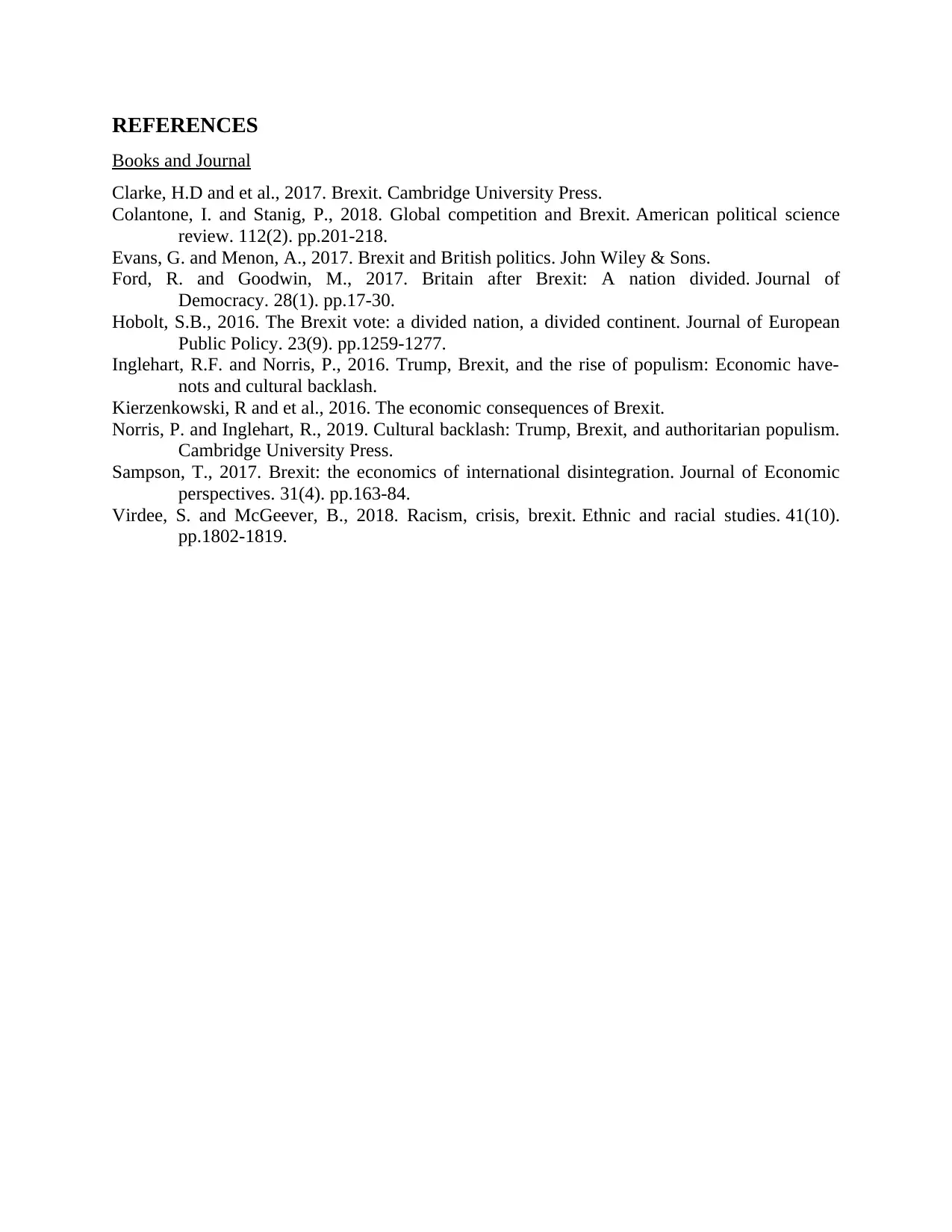
REFERENCES
Books and Journal
Clarke, H.D and et al., 2017. Brexit. Cambridge University Press.
Colantone, I. and Stanig, P., 2018. Global competition and Brexit. American political science
review. 112(2). pp.201-218.
Evans, G. and Menon, A., 2017. Brexit and British politics. John Wiley & Sons.
Ford, R. and Goodwin, M., 2017. Britain after Brexit: A nation divided. Journal of
Democracy. 28(1). pp.17-30.
Hobolt, S.B., 2016. The Brexit vote: a divided nation, a divided continent. Journal of European
Public Policy. 23(9). pp.1259-1277.
Inglehart, R.F. and Norris, P., 2016. Trump, Brexit, and the rise of populism: Economic have-
nots and cultural backlash.
Kierzenkowski, R and et al., 2016. The economic consequences of Brexit.
Norris, P. and Inglehart, R., 2019. Cultural backlash: Trump, Brexit, and authoritarian populism.
Cambridge University Press.
Sampson, T., 2017. Brexit: the economics of international disintegration. Journal of Economic
perspectives. 31(4). pp.163-84.
Virdee, S. and McGeever, B., 2018. Racism, crisis, brexit. Ethnic and racial studies. 41(10).
pp.1802-1819.
Books and Journal
Clarke, H.D and et al., 2017. Brexit. Cambridge University Press.
Colantone, I. and Stanig, P., 2018. Global competition and Brexit. American political science
review. 112(2). pp.201-218.
Evans, G. and Menon, A., 2017. Brexit and British politics. John Wiley & Sons.
Ford, R. and Goodwin, M., 2017. Britain after Brexit: A nation divided. Journal of
Democracy. 28(1). pp.17-30.
Hobolt, S.B., 2016. The Brexit vote: a divided nation, a divided continent. Journal of European
Public Policy. 23(9). pp.1259-1277.
Inglehart, R.F. and Norris, P., 2016. Trump, Brexit, and the rise of populism: Economic have-
nots and cultural backlash.
Kierzenkowski, R and et al., 2016. The economic consequences of Brexit.
Norris, P. and Inglehart, R., 2019. Cultural backlash: Trump, Brexit, and authoritarian populism.
Cambridge University Press.
Sampson, T., 2017. Brexit: the economics of international disintegration. Journal of Economic
perspectives. 31(4). pp.163-84.
Virdee, S. and McGeever, B., 2018. Racism, crisis, brexit. Ethnic and racial studies. 41(10).
pp.1802-1819.
1 out of 7
Related Documents
Your All-in-One AI-Powered Toolkit for Academic Success.
+13062052269
info@desklib.com
Available 24*7 on WhatsApp / Email
![[object Object]](/_next/static/media/star-bottom.7253800d.svg)
Unlock your academic potential
Copyright © 2020–2025 A2Z Services. All Rights Reserved. Developed and managed by ZUCOL.




